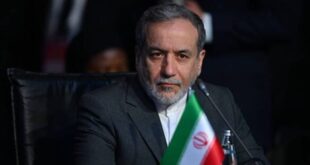 VIENNA (AFP) – A meeting opening in Vienna Monday of the UN nuclear agency could bring Iran one step closer to a third round of sanctions against its nuclear programme.“The distance to New York has shortened,” said a diplomat, referring to the UN Security Council which sits in New York and has already imposed two rounds of sanctions against Iran for nuclear activities that raise fears it seeks atomic weapons.
VIENNA (AFP) – A meeting opening in Vienna Monday of the UN nuclear agency could bring Iran one step closer to a third round of sanctions against its nuclear programme.“The distance to New York has shortened,” said a diplomat, referring to the UN Security Council which sits in New York and has already imposed two rounds of sanctions against Iran for nuclear activities that raise fears it seeks atomic weapons.
The Vienna-based International Atomic Energy Agency will be hearing this week a report from IAEA chief Mohamed ElBaradei which states that Iran is in fact expanding uranium enrichment work, the process that makes fuel for civilian nuclear reactors but that can also produce atom bomb material.
Iran had as of May 13, over 1,300 centrifuges enriching uranium at an underground facility in Natanz, according to a copy of the report obtained by AFP.
Iran could reach its goal of industrial scale production with 3,000 centrifuges running by the end of June, a senior official close to the IAEA said.
This number of centrifuges if running at full capacity could make enough enriched uranium for a bomb in a little less than a year, according to experts.
Iran insists its programme is a peaceful effort to generate electricity, to which it has a right under the nuclear Non-Proliferation Treaty, but the United States charges that this is only a cover for developing atomic weapons.
The crisis over Iran’s nuclear ambitions is escalating.
Iran warned on Sunday that it would use its missiles to strike US military bases in neighbouring Gulf states if they were used as staging posts to attack the Islamic republic over its nuclear programme.
Washington has always said it wants to resolve the crisis through diplomacy but has never ruled out using military action.
American and Israeli air forces on Sunday began week-long joint exercises in southern Israel, simulating dog-fights and bombing targets on the ground, the army said.
It said the exercises were taking place in the context of US-Israeli discussions on Iran’s nuclear program.
Meanwhile, Russia, a key trading partner and ally of Iran, said a proposed US missile defence shield could complicate resolving the Iranian crisis.
Russian Foreign Minister Sergei Lavrov said on Saturday in Moscow that “the deployment of the missile shield in Europe may complicate (diplomatic) … efforts, put in question Iran’s willingness to openly cooperate.”
The Group of Eight powers, which includes both the United States and Russia, had Friday at the end of a summit in Germany threatened to take new measures against Iran if Tehran continues to ignore UN demands to halt its uranium enrichment.
ElBaradei’s report to the IAEA’s 35-nation board of governors, which has already been sent to the Security Council, could open the door to new sanctions.
Analysts say there is still time for diplomacy, as Iran has made progress in enrichment but is exaggerating its technological prowess.
Former UN weapons inspector David Albright said from his ISIS think tank in Washington that Iran could not get a bomb before 2009, and Israel also puts 2009 as the worst-case scenario for this.
ElBaradei, meanwhile, has drawn US ire for saying that the West should accept that Iran has acquired the knowledge to enrich and so it is unrealistic to expect it to halt this work entirely.
Talks between EU foreign policy chief Javier Solana and Iranian chief nuclear negotiator Ali Larijani on May 31 in Madrid failed to achieve a breakthrough but this diplomatic initiative is continuing.
A deputy to Larijani, Javad Vaidi, is to meet in Vienna Monday with European representatives to prepare another Larijani-Solana meeting and to find ways for Iran to answer key, outstanding questions in the IAEA’s investigation of Iran’s nuclear programme, a move the Iranians promised to Solana as a confidence-building measure.
The IAEA board will also this week be considering the agency’s secretariat’s request for a two percent increase in its budget amid increasing demands placed on its verification work, despite Japanese and German objections to giving the agency more money, diplomats said.
 Eurasia Press & News
Eurasia Press & News



